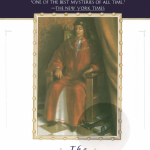Harry Dresden’s a man of the dirty streets of Chicago, a tarnished knight who can’t resist helping the next damsel in distress to come along. One of his enemies bought a burial plot and tombstone for him; it says, “Harry Dresden — He died doing what he thought was right,” and in all likelihood that’s a true prophecy. Oh, and he’s a wizard-for-hire. Call it wizard-noir.
There are currently fifteen volumes in Jim Butcher’s Dresden Files series. I started reading when there were six or seven, and was eagerly reading each new book when the 12th, Changes, came out. Several friends read it, and I heard mixed reviews, all involving the last chapter. One hated the last chapter. Another said, “Read everything but the last chapter. Don’t read that until the next book is available.” So I stopped with the 11th, and waited until a few weeks ago.
And then, of course, being me, I re-read the series to date, from the first book, Storm Front, to the 11th, Turn Coat. It was an interesting process, because we get to watch Jim Butcher maturing as an author at the same time as Harry Dresden is maturing as a character.
But first, some background for those who’ve not read the series.
Harry Dresden is a young wizard, and a member of the White Council. Unlike most wizards, who lead lives of secrecy, he sets up as a wizard-for-hire in the city of Chicago, and moonlights as an advisor to the Special Investigations branch of the Chicago Police Department. And because this is noir, he’s under a cloud. As a child he was adopted and trained by a wizard, Justin DuMorne, who then attempted to enslave him to his will so as to steal his power. Harry killed him in self-defense—using magic, which is a violation of the First Law of Magic, and carries a sentence of sudden, immediate death from the White Council. But it was self-defense, after all…but black magic warps the user, and almost invariably leads to worse and worse acts and greater and greater loss of life. Harry finds himself under the Doom of Damocles: he is allowed to live, but if he sticks one toe over the line, Warden Morgan’s sword is going to come down on him like a ton of bricks and no one is ever going to find the pieces.
Every private-eye—and let’s face it, that’s what Harry is—has to have a police detective on tap. In Harry’s case, that’s Lieutenant Karrin Murphy, the head of the CPD’s Special Investigations branch. When weird and supernatural things happen, it’s SI’s job to investigate and make them look normal. It is not a plumb position, but Murphy does her best. Said detective can be a friend or an enemy; in Harry’s case, Murphy is a friend; she’s also, in Harry’s words, “one of the good ones.”
And then there’s the whole rest of the supernatural world, which is out there and active just where most of us can’t see it. There are two groups of vampires active in Chicago, the Red Court and the White Court; there are werewolves; there are the Seelie and Unseelie Courts of Faerie, who dabble in the mortal world from time to time; there are a whole host of other critters from the Nevernever, a land coexistent with our own of which Faerie is only one small part. And when any of them start hurting innocent people, Harry feels like he needs to take a hand.
The series as a whole (at least through book 11) is great fun. Be warned, though, that although the first four books show promise, they are kind of clumsy. We’re assured that Karrin Murphy is a good friend of Harry’s, but she clearly doesn’t trust him and won’t cut him any slack. Harry has to be careful what he tells people, since telling them things can get them killed, so he tells them that he can’t tell them anything; it never seems to occur to him that he could tell them just a little. For example, it doesn’t occur to him to say, “I could tell you that, but if certain people found out we’d both be dead. I’d like to avoid that.” Instead, he puts Murphy off in precisely the way most likely to make her angry.
Similar things abound, and I’d advise readers to start with book 5, Death Masks, except that the first four contain needed background. Butcher begins to hit his stride with book 5, and by book 6, Blood Rites, he’s got it all together, and it’s all quite satisfying.
A few caveats. First, the Dresden files is toward the horror end of the fantasy spectrum, and some of the scenes are quite gruesome. Not Stephen King gruesome, but probably more than enough for the squeamish. Second, as is common in publishing these days, there’s a fair amount of sex. Not that Harry gets a lot; it’s a running gag that he doesn’t. But many of the monsters (especially some of the vampires) use sexual allure to snare their victims, and some of the bad guys have a kinky streak. The sex is rarely graphic (except for a steamy scene involving Harry and his ex-girlfriend who’s on the verge of turning into a vampire). But be prepared for lots of incredibly sexy ladies with monsters on the inside, and for the general modern attitude that if you’re not having sex frequently there’s something wrong with you.
Beyond that, though, there’s quite a lot for this Catholic to like. Harry is tough, clever, and if he’s tarnished he always does what he thinks is right, even if it might get him killed. The Catholic Church figures in certain books, and (except for occasional references to medieval witch hunts) is handled sympathetically. The best safe-house in the city, when confronted with dire supernatural evil, is St. Mary’s, pastored by the aptly named Fr. Forthill, and one of Harry’s closest friends, Michael Carpenter, is not only a staunch Catholic but also a Knight of the Sword: he carries one of three blessed swords made from the nails from the True Cross, and travels hither and thither smiting evil.
And then there’s the whole thing with demons. Demons figure prominently in lots of fantasy novels, but these fantasy demons usually have nothing to do with the demons of orthodox theology, even when they are supposed to. In the Dresden Files, the creatures called demons are simply powerful and nasty creatures from the far reaches of the Nevernever; they explicitly have nothing to do with fallen angels. And when Harry eventually is attacked by a genuine fallen angel, it’s an appropriately moral attack, not a physical one, and is given all due weight. I don’t know where Butcher stands on matters of religion, but he seems to know where the real dangers are.
And in fact, amid all of the monsters and death and temptation and gore, that’s what the series is about: doing the right thing, and figuring out what the right thing is, even when it’s hard, and standing your ground against evil, and loyalty, and love.
So, bottom line: if you like detective fiction, and you like fantasy, and you don’t mind a little horror, and you’re willing to slog through the first four books to get to the good stuff, you ought to give Harry Dresden a try.
Now I’m going to go read Changes. More later.












